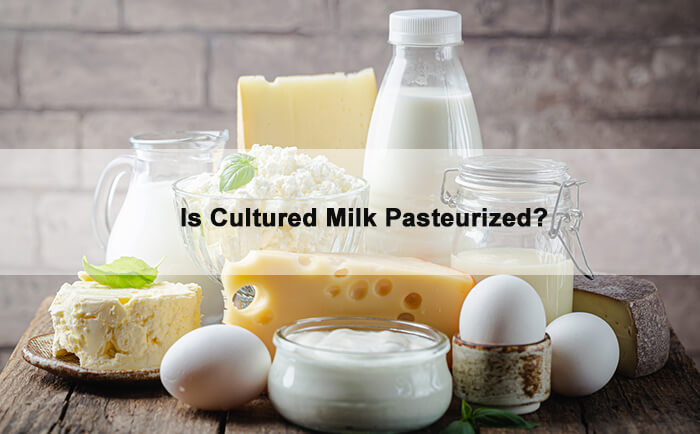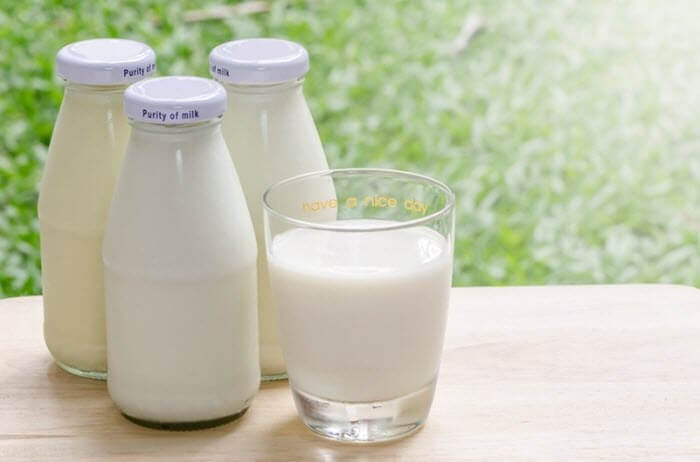When shopping at the grocery store, there are dozens of options when it comes to milk products.
Cultured, pasteurized, fermented – you may have seen these words on milk products at the grocery store but you might not know what it means.
What does cultured mean? What does pasteurized mean? Is cultured milk pasteurized? What kind is best?
In this article, we will break it all down so you can be well informed when you are making food choices.
Table Of Contents
What is Cultured Milk?
Cultured milk is low-fat or non-fat milk that has been fermented with lactic acid. Because cultured milk is created through a fermentation process, cultured milk is also known as “fermented milk.”
Sounds scientific, doesn’t it? Let’s break it down more.
So why would milk (or other dairy products) need to be fermented? Fermentation means “good bacteria” is added to the milk. Typically, this means a live probiotic is added to the milk. You’ve probably heard the term “probiotic” before, as news of the health benefits of digesting probiotics has become a popular topic in the health and diet world. Probiotics are commonly found in yogurt, yogurt/smoothie-type drinks, etc. Probiotics can improve digestibility, enhance taste, improve gut health and even increase the product’s shelf life.
Examples of cultured milk products you’ve probably seen at the grocery store are Kefir (a yogurt-like drink), sour cream, yogurt, and cheese.
You may like: Top 14 Yogurt Substitutes in Recipes
Because of the added “good bacteria,” cultured milk is a great option for those with milk allergies, lactose sensitivity, or lactose intolerance. The probiotics can help those with lactose sensitivities digest the food.
Is cultured pasteurized milk ok when pregnant?
Cultured milk products also tend to have more protein, calcium, and other vitamins, making them a healthy choice, especially for pregnant women who are looking for that extra nutrition boost. While pregnant women still need to avoid certain dairy products such as soft cheeses, cultured milk products like yogurt are a great choice, full of nutritional benefits.
All cultured milk is pasteurized, which leads us to our next topic – what is pasteurized milk.
What is Pasteurized Milk?
Plainly speaking, pasteurized milk is the milk you will find in the refrigerated section of your local grocery store. The milk that you and your family use each morning in your cereal bowls is pasteurized milk.
The scientific explanation is that pasteurized milk is a raw milk that has been heated to a temperature high enough and for a long enough period of time to kill harmful bacteria.
When the term “raw milk” is used, it refers to milk collected from cows, goats, sheep, and other dairy animals. The milk that is collected on farms across the country is raw until it goes through the pasteurization process and can be commercially sold.
Why is all milk pasteurized?
Pasteurization is a necessary process because when milk is collected from dairy animals, it contains pathogens, such as E.coli, salmonella and listeria, which can make people very sick. These types of bacteria can cause health issues, such as diarrhea, vomiting, and flu-like symptoms. Ingesting these types of bacteria is dangerous for everyone (even people who are relatively healthy) but it’s especially dangerous for children, older adults, pregnant women, and those with a weakened immune system. Therefore, unpasteurized milk (or raw milk) is not recommended for human consumption.
When shopping at a typical big, box grocery store, most of the milk you see on the shelf will be pasteurized. In 1987, the FDA issued a regulation prohibiting the sale of raw milk between two states (the fancy word for this is “interstate sale”). However, some states still allow the sale of raw milk within the state borders. Each state has its own laws regarding the sale of raw milk and you may find raw milk for sale in smaller grocery markets, alternative grocery stores, or on farms.
Pasteurized vs Cultured Milk: Similarities & Differences
Now that we’ve broken down the scientific definitions of cultured milk and pasteurized milk, let’s recap what we know about pasteurized and cultured milk and explore their differences.
Summary: Is Cultured Milk Pasteurized?
The most important thing to keep in mind is this: Most commercially sold milk is pasteurized but not all pasteurized milk is cultured (or fermented).
A great way to think about it is this – pasteurization is a process of elimination and culturing is a process of addition. Simply put, pasteurization removes dangerous pathogens from raw milk and the process of culturing adds good bacteria that have many health benefits.
The typical steps to get milk from the farm to the grocery store:
- Milk is collected from dairy animals
- Milk is pasteurized
- Pasteurized milk can be shipped to grocery stores OR
- Milk is cultured with probiotics to create other milk products
- Cutlured milk products are shipped to grocery stores
Similarities
They are both great options to incorporate into your diet (depending on your tolerance for dairy products)
Differences
Cultured milk adds “good bacteria” to pasteurized milk. Cultured milk will taste different than regular pasteurized milk and can be a great choice for those who do not like typical, pasteurized milk products.
Next time you’re grocery shopping, check out the refrigerated milk section and you’ll notice that the typical non-fat or low-fat milk will be pasteurized but not cultured. However, if you check out the yogurt drinks or buttermilk options, you will probably see the word “cultured” on the product label.
If you’re specifically interested in buying cultured milk products, make sure to read the labels to ensure you are buying a cultured milk product.
As you continue to learn about pasteurization and fermentation of dairy products, a key point to always remember is the FDA, CDC and other scientists do not recommend the consumption of unpasteurized (also known as raw) milk for anyone due to the health risks associated with the bacteria that is found in raw milk.
Although cultured milk also contains bacteria, it is a good type of bacteria that helps promote gut health and provides protein, calcium, and other critical vitamins.
Conclusion
Dairy products, especially milk, are an integral part of many people’s diets and can help people consume a well-rounded diet.
Now that you know what pasteurized milk is and what cultured milk is, you can better understand nutrition labels, the health benefits of dairy products, and what’s best for you and your family.




Thank you for this article I am a recent Heart transplant patient. I love cheese, I picked one made with cultured milk and was afraid to eat it because I was not sure exactly what cultured meant. However, after reading this article I now have a clear understanding of the cultured process. Thank you for making me aware.